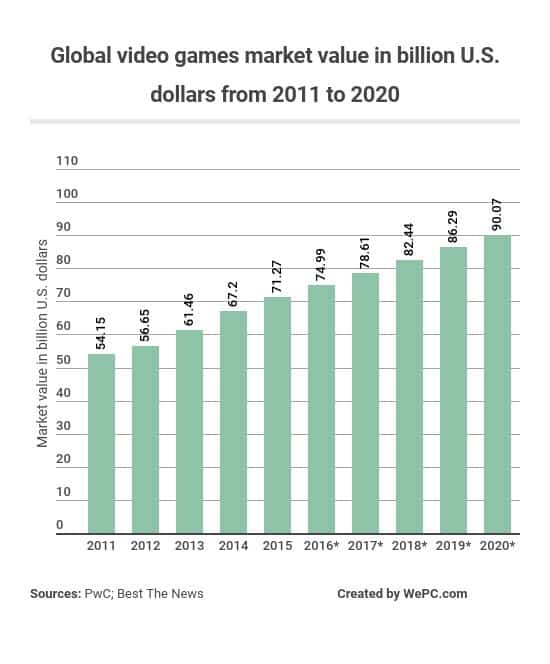7 Key Steps in Game Development
Game Development is a bigger task than ever these days. It is easy to see the phrase development hell and wonder how studios get themselves into such difficulties. A Quick look at the long drawn out process of game development illustrates this.

Game Development is Like Alchemy
Modern day game development is like modern day alchemy. Simply put, it is the process of making a video game. However, in a more complex manner it is the combination of the fields of Computer Science, Mathematics, Marketing, Production and even customer relations to produce a marketable and profitable product. But why is it so complex? Consider this, the larger an industry becomes, the more pressure there is to compete. According to WePC.com, in the US alone the games industry is expected to be worth over 90 billion US dollars by 2020. Whilst in the UK the industry is confirmed to be more lucrative than Music and Video combined. With that comes its own challenges, not least the desire perfection as game development strive to make the perfect game.

It Blows your mind
As you can gauge from the illustration above, the market value of the industry has been rapidly climbing in the US and the UK is not far behind. In fact if you really want your mind blown it is worthwhile visit WePC's page on the Video Game Industry Overview. Some of the stats are mind blowing. With that in mind, it is worthwhile taking a look at long drawn out process that can be game development from cradle to grave, or in this case a twinkle in a developers eye to a game on the shelf or digital store.
1) Conception
 Conception in gaming happens as in any other product. Where better to begin than a good wholesome brainstorm. Of course this brainstorm can vary depending on the type of game being conceptialised. If the game is a brand new product, the brainstorming will be more abstract than say the development of a service game already in operation or a long running series. A design team will collect the concepts of the game and pick out feature elements. An aesthetic, story, genre, and of course the mechanics of the game including gameplay. From here a lead designer collates the information and will then allocate tasks. An art team will focus on the assets with an art director determining the aesthetic whilst the lead artist will work with a small team designing assets to feedback to the rest of the team. Content designers and their teams will focus on the story, narrative, character development.
Conception in gaming happens as in any other product. Where better to begin than a good wholesome brainstorm. Of course this brainstorm can vary depending on the type of game being conceptialised. If the game is a brand new product, the brainstorming will be more abstract than say the development of a service game already in operation or a long running series. A design team will collect the concepts of the game and pick out feature elements. An aesthetic, story, genre, and of course the mechanics of the game including gameplay. From here a lead designer collates the information and will then allocate tasks. An art team will focus on the assets with an art director determining the aesthetic whilst the lead artist will work with a small team designing assets to feedback to the rest of the team. Content designers and their teams will focus on the story, narrative, character development.
2) The Prototype
The teams will combine to produce experimental assets and gameplay elements. The programmers will build a framework and prototype. The artists will create the illustrations and concept art. At the same time storyboard, landscapes and drawing are created to feedback to the rest of the teams. The sole purpose of this is to gain feedback and test out reaction to models. This cycle must continue several times over to allow the game to evolve into a core concept. Once the feedback is satisfactory and the design lead is appeased with the concept the game will move onto its' next stage.
3) Production
 Step 3 and 4 work simulataneously. It is now the programmers turn to shine and the gaming aspect staff. Their job is to construct the full game. The design team liaises with the programmers and the artist detailed the elements that must be created. The programmers utilise complex code to build 2D and 3D graphics working closely with the artists. The modelers and animators work to build the 3D environments and 3D characters working in tandem with the programmers to ensure these can be graphically rendered. The programmers also have the jobs of finalising the games' engine, including the physics and graphical limitations. These limitation govern the rest of the game as to what is physically possible within the gaming universe that is created. There are many different programmers who operate during this stage. Artificial Intelligence programmers work to ensure the NPCs and characters function in a way that is appropriate to their identity. Physics programmers focus on the interactions between the world, objects, and the characters. For an easy example consider the simple motion of of ball or grenade being thrown at a wall. Network programmers work to implement an effective online play by writing code allowing a user interface and connection between players and the servers.
Step 3 and 4 work simulataneously. It is now the programmers turn to shine and the gaming aspect staff. Their job is to construct the full game. The design team liaises with the programmers and the artist detailed the elements that must be created. The programmers utilise complex code to build 2D and 3D graphics working closely with the artists. The modelers and animators work to build the 3D environments and 3D characters working in tandem with the programmers to ensure these can be graphically rendered. The programmers also have the jobs of finalising the games' engine, including the physics and graphical limitations. These limitation govern the rest of the game as to what is physically possible within the gaming universe that is created. There are many different programmers who operate during this stage. Artificial Intelligence programmers work to ensure the NPCs and characters function in a way that is appropriate to their identity. Physics programmers focus on the interactions between the world, objects, and the characters. For an easy example consider the simple motion of of ball or grenade being thrown at a wall. Network programmers work to implement an effective online play by writing code allowing a user interface and connection between players and the servers.
4) The components of a game
 Writers, audio teams, and level designers combine to build the key aspects of the game. The writers build effective dialogue to work within the narrative of the game, audio staff will focus on the sounds including audio effects and voice acting often with external actors bought in. Level and game mechanic designers build the quests, individual levels and the tactical gameplay. They code the games environments and settings as well as the gameplay that will take place within them.
Writers, audio teams, and level designers combine to build the key aspects of the game. The writers build effective dialogue to work within the narrative of the game, audio staff will focus on the sounds including audio effects and voice acting often with external actors bought in. Level and game mechanic designers build the quests, individual levels and the tactical gameplay. They code the games environments and settings as well as the gameplay that will take place within them.
5) Completion
Keep in mind completion is not the end of the process by any means. The game must be tested, or not in the case of some games. (Cough, Fall Out 76, Cough). The three stages to this are generally Alpha, Beta and Gold. These are key development milestones, however with each cycle the errors and bugs are fed back to the designers, programmers and artists to correct and amend before the game hits the shelf. Testing has many stages: Play testing will test the functionality of the game. Focus testing will monitor with specific demographics, namely the target playing demographic. The Beta will usually pick up the majority of bugs however a day one patch is usually required for the game to function as intended upon release. All this information is analysed and evaluated before the final release of a game. Technically speaking if a game does not satisfy the quality assurance process it should not go to market. Unfortunately the pressures of modern game development mean often there are strict timelines that must be be adhered to. Think holiday release dates and company share prices.
6) Marketing
There are many elements to the marketing in Video Games. These include but are not limited to digital marketing such as online advertising, web adverts, copywriting, social media campaigns to larger scale marketing such as stunts and TV advertising which is possibly the most expensive but most far reaching. It is assumed by many sources that many Triple AAA studios spend 2 to 3 times the development budget on marketing. A lot of this is down to the will of the company to break the game into the top ten rankings after all when some companies like Rockstar are spending as much as $300 million on marketing and possibly $300 million on development. At a cost of $60 a game. The game has to ship 10 million units just to break even. Red Dead Redemption 2 has a similarly mammoth budget but as a result of effective marketing the games went on to sell over 23 million copies. Money well spent? The shareholders at Rockstar would certainly nod their heads enthusiastically. 
7) This is not the end
Like any good game, the journey does not stop here. Especially with the prevalence on online gaming. Online games and games as a service need ongoing support, patching, updates and expansion to keep the players engaged in a market with healthy competition. Look at the likes of Fortnite. The gaming crunch culture is never-ending but is symptomatic of a culture that struggles yet achieves gaming dominance. Colin Campbell writes for Polygon revealing the intense pressure and long hours that go into keeping a game relevant. Game development can no longer be seen as a vocation for slackers as it once would in the 80s and 90s. it is big business and with that comes big business practices. Namely exploiting enthusiastic gaming staff who have always dreamed about breaking into such a magical industry. These are the 7 steps of gaming development. There are most likely more and not every game will adhere to these but most triple AAA games will have these foundations in the development process. If you liked this article why not check out my article on 5 key ingredients every world needs and why not sign up to my mailing list on
Read more about:
BlogsAbout the Author(s)
You May Also Like







.jpeg?width=700&auto=webp&quality=80&disable=upscale)








